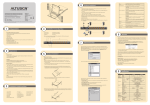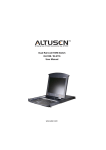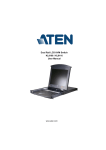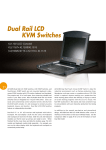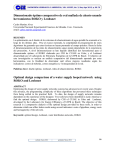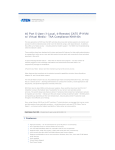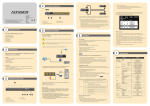Transcript
1 6 2 3 4 Hardware Installation 2 General User Management 5 6 7 8 9 10 11 KL9108 Hideaway™ LCD KVM Switch Quick Start Guide KL9116 Hideaway™ LCD KVM Switch Quick Start Guide 12 13 ® © Copyright 2006 ATEN International Co., Ltd. Altusen and the Altusen logo are trademarks of ATEN International Co., Ltd. All rights reserved. All other trademarks are the property of their respective owners. This product is ROHS compliant. PAPE-1214-R00G 14 15 1. (Optional) Connect the external consoleʼs monitor, keyboard, and mouse to the console ports on the rear panel of the KVM switch. 2. Using a KVM cable set, plug the custom SPHD connector into any available KVM port on the switch. 3. At the other end of the cable, plug the keyboard, mouse and video cables into their respective ports on the computer. Repeat steps 2 and 3 for any additional computers you are installing. 4. Plug the LAN, WAN or Internet cable into the KL9108 / KL9116's RJ-45 socket. 5. Connect the power cord to the switch and to an AC power source appropriate for the KL9108 / KL9116. 6. Power on the switch. 7. After the switch is powered on, power on the computers. Note: Although the KL9116 is pictured in the diagram, the installation process is the same for the KL9108. 3 RADIUS 2 4 Package Contents The KL9108 / KL9116 package consists of: 1 KL9108 or KL9116 Hideaway™ LCD KVM Switch with Standard Rack Mount Kit 2 Custom KVM Cable Sets 1 Power Cord 1 User Manual 1 Quick Start Guide 1 Registration Card Date/Time 4 4. KVM Ports (CPU Ports) 5. External Console Section 6. LAN Port 1. Power Socket 2. Power Switch 3. PON Port 1 Note: For the sake of brevity only the KL9116 is pictured here. The front and rear panel views are similar for the KL9108. 1 2 3 8 4 7 5 6 System Requirements Administrator Setup Once the KL9108 / KL9116 has been installed, the next step that the Administrator needs to perform is to set up the unit for user operation. The most convenient way to do this for the first time is from the local console. After the KL9108 / KL9116 turned on, a login prompt appears on the console monitor: Since this is the first time you are logging in, use the default Username: administrator; and the default Password: password. Browser Operation An On Screen Display (OSD) interface governs KL9108 / KL9116 computer control and switching operations. The OSD can be accessed remotely with a Windows-based client or a Java-based client. You must log in via an Internet browser to connect to the KL9108 / KL9116 and to invoke the OSD. To log in from an Internet browser: 1. Open the browser and specify the IP address of the KL9108 / KL9116 in the URL bar. Note: If you donʼt know the IP address, get it from the KL9108 / KL9116 administrator. 2. When the Security Alert dialog box appears, accept the certificate. 3. A login page appears KL9116 Login External Console • A VGA, SVGA, or MultiSync monitor capable of displaying the highest resolution provided by any computer in the installation • PS/2 keyboard and mouse Computers The following equipment must be installed on each computer: • A VGA, SVGA or MultiSync video graphics card with an HDB-15 port • PS/2 mouse and keyboard ports (6-pin Mini-DIN) Remote Computers • For best results, computers that remotely access the KL9108 / KL9116 should have at least a P III 1 GHz processor, with their screen resolution set to 1024 x 768. • Users who want to access the KL9108 / KL9116 with the Windows Client must have DirectX 7.0 or higher installed. • If you don't already have it, DirectX is available for free download from Microsoft's web site: http://www.microsoft.com/downloads. • Users who want to access the KL9108 / KL9116 with the Java Client must have Sun's Java 2 (1.4.2 or higher) runtime environment installed. Java is available for free download from the Sun Java website:http://java.sun.com. • Browsers must support 128-bit SSL encryption. • For best results, a network transfer speed of at least 128 Kbps is recommended. Cables Use ATEN's high-quality, custom cables to ensure reliable switching among computers and daisy chained switches. 3 Security Customization KL9108/KL9116 Unit (Rear View) Optional Equipment Depending on any optional equipment that you may have purchased, one of the following may be included in your package: • Standard Rack Mount Kit - Long • Easy Installation Rack Mount Kit - Short • Easy Installation Rack Mount Kit - Long 2 Network 16 Printing Date: 07/2006 5 1 Service Configuration The General Page presents four items of information: Device Name, MAC Address, Firmware Ver, Last IP from DHCP Server. The User Management dialog box is used to create, delete and manage user profiles. Up to 64 user profiles can be established. Access Port As a security measure, if a firewall is being used, the Administrator can specify the port numbers that the firewall will allow, and set the firewall accordingly. Users must specify the port number when they log in to the KL9108 / KL9116. If an invalid port number (or no port number) is specified, the KL9108 / KL9116 will not be found. Log Server In this panel, you specify the MAC address and a port number for the computer that the Log Server resides on. The Network dialog is used to specify the KL9108 / KL9116ʼs network environment. IP Address The KL9108 / KL9116 can either have its IP address assigned dynamically (DHCP), or it can be given a fixed IP address. DNS Server You can set the KL9108 / KL9116 to automatically obtain the DNS server address, or you can specify the primary and alternate DNS serversʼ addresses. If you are using a RADIUS server, RADIUS Configuration allows you to set up its parameters. The Security page controls access to the KL9108 / KL9116. The Customization dialog box is arranged in four major sections: Login Failures, Working Mode, I/O, and Miscellaneous. The Date/Time dialog box lets the Administrator set up the KL9108 /KL9116ʼs time parameters: 5 KL9116 Login Hardware Installation 1 Standard Rack Mounting A standard rack mounting kit is provided with your KL9108/KL9116. The kit enables the switch to be mounted in rack with a depth of 42 - 77 cm. Note: 1. It takes two people to mount the switch: one to hold it in place; the other to screw it in. 2. Optional mounting kits - including single person Easy Installation kits – are available with a separate purchase. 4. Provide a valid Username and Password (set up by the KL9108 / KL9116 administrator), then Click Login to continue. After you successfully log in, the Local Console OSD appears: After you have successfully logged in, the KL9108 / KL9116 Main Webpage appears with the General dialog box displayed. You can click the Windows Client button (or Java Client button) to activate the browser-based Windows Client OSD (or Java Client OSD). KL9116 Main 1. Packing material has been inserted to protect the KL9108/KL9116 during shipping. Slide the LCD module out until the packing material is visible. Remove the packing material before installing the unit, as shown in the diagram below. 9 2. While one person positions the switch in the rack and holds it in place, the second person using the screws provided with the rack mounting kit - loosely screws the front brackets to the rack. KL9108/KL9116 Unit (Front View) Computer Connections Console Connections Port Selection The OSD consists of four pages, each with a specific set of functions: Main, Configuration, Administration, and Log. 1. The Main page governs port access. Selecting a port and double-clicking it switches you to the device on that port. 2. The Configuration Page sets the operating parameters for each user. 3. The Log Page brings up the contents of the log file. 4. The Administration Page: When you click the Administration tab, the Administration page comes up. Each of the administrative functions is represented by an icon at the left of the page. Function Connectors Switches LEDs KL9116 KL9108 8 64 (via Cascade) Direct Max. Local Remote External Console Port KL9116 General 3. While the first person still holds the switch in place, the second person slides the L brackets into the switch's side mounting brackets, from the rear until the bracket flanges contact the rack, then - using the screws provided with the rack mounting kit - screws the L brackets to the rack. Specifications Keyboard Video Mouse KVM Port External Mouse Power LAN PON Reset Port Selection Power LCD Power LCM Adjustment On Line Selected Power Num Lock Caps Lock Scroll Lock Link 10 / 100 Mbps Keyboard/Mouse 17” LCD Remote 1. Upper Handle 7. Touchpad 13. External Mouse Port 2. LCD Display 8. Lower Handle 14. Port Selection Area Video 3. LCD Controls 9. Rack Mounting Tabs 15. Reset Switch 4. Port LEDs 10. LCD Release Catch 16. Power LED 5. Keyboard 11. LCD On/Off Button 6. Keyboard Release Catch 12. Lock LEDs Scan Interval I/P Rating Power Consumption Operating Temp. Environment Storage Temp. Humidity Housing Physical Weight Properties Dimensions (L x W x H) 4. After the L brackets have been secured, tighten the front bracket screws Emulation KL9116 16 128 (via Cascade) 1 1 OSD, Hotkey, Pushbutton 1 x 6-pin Mini-DIN Female (Purple) 1 x HDB-15 Female (Blue) 1 x 6-pin Mini-DIN Female (Green) 8 x SPHD-15 Female 16 x SPHD-15 Female (Yellow) (Yellow) 1 x 6-pin Mini-DIN Female (Green) 1 x 3-prong AC Socket 1 x RJ-45 Female (Black) 1 x DB-9 Male (Black) 1 x Semi-recessed Pushbutton 2 x Pushbutton 1 x Rocker 1 x Pushbutton 4 x Pushbutton 8 (Green) 16 (Green) 8 (Orange) 16 (Orange) 1 (Blue) 1 (Green) 1 (Green) 1 (Green) 1 (Green) 1 (Orange/Green) PS/2 1280 x 1024@75Hz; DDC2B 1600 x 1200@60Hz; DDC2B 1–255 Seconds 100–240V AC; 50/60 Hz; 1A 120V/31W; 230V/39W 0–40°C -20–60°C 0–80% RH, Non-condensing Metal 17.1 kg 17.3 kg 70.5 x 48.2 x 4.4 cm 70.5 x 48.2 x 4.4 cm All specifications are subject to change without notice.
